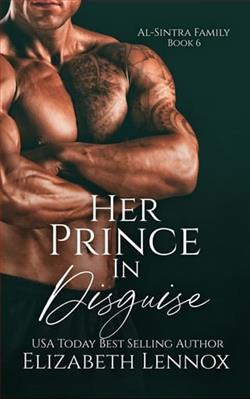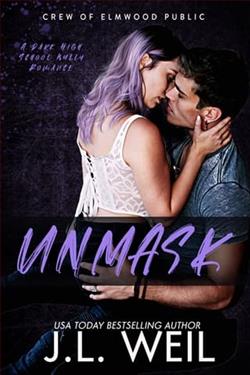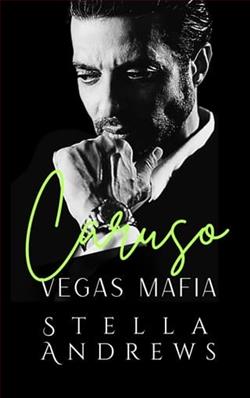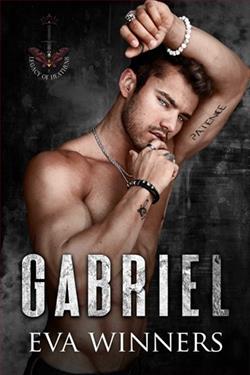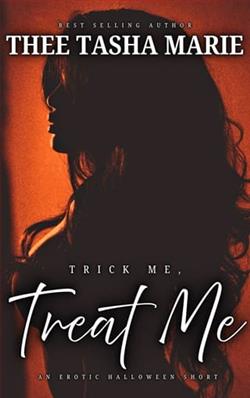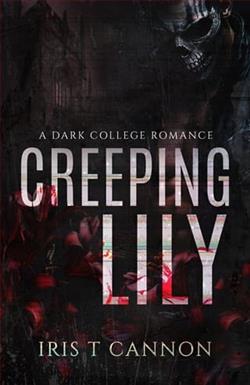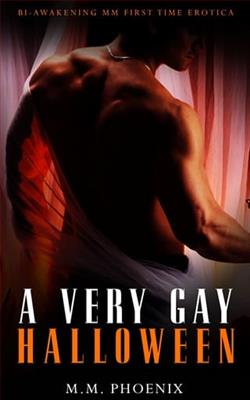Page 46 of Like a Love Story
“I jumped a kid who called me a faggot at school,” I say.
Stephen nods. He moves the ice to the other side of my face. It chills me and makes me feel better. “We need to be better than them,” he says.
“Why?” I ask.
He shrugs. “Because we have no choice. We’re held to different standards.”
“He cracked my camera lens,” I say.
“I can buy you a new lens,” he says.
“No,” I say. “No.” I lift my camera. I point it at Stephen and manipulate it until his face is in focus. The crack in the lens shows up in the viewfinder, like a thunderbolt from above that cuts his face in half. It makes the image look like it was attacked. I snap a photo. “I’ll keep it for now. I want to photograph you and your friends if you’ll let me. I’ll make you beautiful. But there will be a crack in each image, so everyone knows. So everyone remembers that we’re under assault.”
He smiles. Nods. He gets me.
“On one condition,” he says.
“What?” I ask.
“No more beating people up, not even the worst homophobes.”
“Deal,” I say.
We shake on it. Then we put onCover Girl, an old Rita Hayworth and Gene Kelly musical. Stephen says he needs something candy colored and optimistic, but he falls asleep almost as soon as the movie starts. His breathing is labored when he sleeps, like he’s gasping for air. Iwatch the movie to the end. Rita plays a singer who performs in her boyfriend’s nightclub. She gets discovered and almost chooses fame and money over love, but in the end she chooses love. I decide there’s nothing optimistic about it. What’s optimistic about other people falling in love?
Judy
I know that dressing like Madonna won’t make me look like her, or allow me to magically turn men on the way she does, but I decide that the time has come for me to inspire Reza to do something more than kiss me. Art’s parents invited my parents to go seeCity of Angelstonight, which means Reza and I will have my place to ourselves. No mom offering him tea and talking to him about her fascination with Persian rug patterns. No dad asking him to play racquetball with him sometime, and telling him how proud he must be of his fellow Iranian Andre Agassi. No book club. Just a boyfriend and a girlfriend in an apartment free of parents. So that’s why I’m making myself lingerie, inspired by the slip and garter Madonna wears in the “Express Yourself” video. If Reza likes her, then I’ll turn into as close an approximation as I can manage. I can be sexy. I can writhe around theroom wearing next to nothing, lick milk out a bowl like a kitty, do whatever it takes to turn him on. It’s been two months now, and I’m ready. I’m ready to feel his skin against mine. I’m ready to put all those lessons about how to use a condom to use. I mean, what’s the point of education if the knowledge is never implemented? I don’t even eat ice cream as I design. I don’t need it this time, since I’m basically copying an existing outfit in my size. All I need is skill, which I have, and a body, which I have. When I’m done, I try it on and stare at myself in the full-length mirror. I don’t look like Madonna, but I look hot. And if I love myself, then others will love me too. That’s what Uncle Stephen told me once.
I see my doorknob turn, my mom trying to shove her way in like she always does. “Sweetie, will you zip me up? Your father can’t seem to make a zipper work. Why is this door locked?”
I quickly throw a sweater and jeans on over the lingerie and open the door. I force a smile. My mother is wearing her little black dress, the same one she wears anytime she goes somewhere nice. She says the beauty of the little black dress is that it can be worn anywhere and never goes out of style. I want to explain to her that when the little black dress first became popular, when Audrey Hepburn wore one, it was like a revolution. Back then, women were supposed to be all busty and curvy and frilly, and here came this skinny, boyish woman wearing sleek, simple clothing. She was a middle finger to the establishment. But then her style became the establishment, andnow it’s like all the moms of the world want to look and dress like her. I hope that when I become a designer, my creations never become the establishment. And if they ever do, I’ll change. I’ll reinvent.
“What were you doing in there?” she asks, peeking into my room for a clue, like I’d be stupid enough to leave one for her.
“Turn around. I’ll zip you up.”
She hesitates for a moment. She doesn’t want to turn around yet. She wants to know why I would lock the door. But she turns, and I carefully zip her up. “Honestly,” she says. “What is it about men and zippers and clasps? Your father still can’t help me put on a necklace either.”
“Hand me the necklace,” I say.
She does. The necklace is gold, with a tiny little diamond dangling from it. Simple. Elegant. Classic. The clasp is small and tricky. You’d need a microscope to see it. My hands are behind her neck, and she pulls her hair up for me. There’s something so painfully intimate about this, these rituals of ours. “This necklace belonged to my mother,” she says softly. “She gave it to me for my thirtieth birthday.”
“So she was capable of kindness back then,” I say coldly.
“She’s capable of kindness now,” my mom says. “Just not toward Stephen.”
“Are you defending her?” I ask.
“I am not,” she says. “But I think it’s important foryou to remember that we are complicated people. Who we are at our worst doesn’t define us, just as who we are at our best...”
“She won’t speak to her own son,” I say.
“And she deserves our silence,” she says. “But she also read to me every night when I was a little girl, and made us the most delicious birthday cakes every year, and took us on trips, and gave me this necklace.”
“Yeah, well, I’m sure Ronald Reagan read to his kids too, but that doesn’t mean I forgive him for killing all of Uncle Stephen’s friends.”
I finally clasp the necklace.








